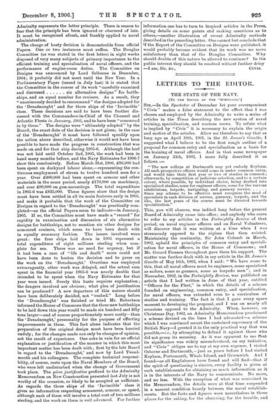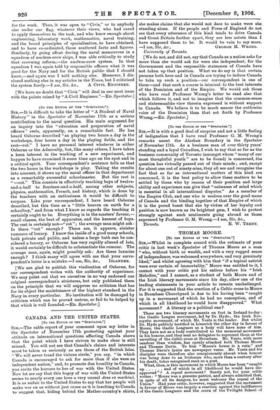LETTERS TO THE EDITOR.
THE STATE OF THE NAVY. tTo TUS EDITOR OF Til “sracrAzoa.") SIR,—In the Spectator of December 1st your correspondent
" Civia " makes a false statement to the effect that I was chosen and employed by the Admiralty to write a aeries of
articles in the Times describing the new system of naval
training, specialisation, and nucleus crews. To refute what is implied by " Civis " it is necessary to explain the origin and motive of the articles. Allow me therefore to say that as
long ago as April 190, 1901, in the St. James's Gazette, I
suggested what I believe to be the first rough outline of a proposal for common entry and specialisation as a basis for the training of naval officers. And in that same newspaper on January 24th, 1902, I more fully described it as follows :—
"The new college at Dartmouth may yet embody Koyham
All such prospective officers would come in under common entry, and would take their first year or two of studies in common ; afterwards, by competition or judicious selection, and to a certain extent, where possible, by individual choice, being drafted into specialized studies, some for engineer officers, some for the various subdivisions, torpedo, navigating, and gunnery service Since any scheme to be effective must recognize the need of specialists in each division of service, gunnery, torpedo, and the like, the last years of the course must be directed towards specialization."
This, you will observe, was indited long before the present Board of Admiralty came into office; and anybody who cares to refer to my articles in the Fortnightly Review of that
period, on naval engineer officers and on Naval Volunteers, will discover that it was written at a time when I was strenuously opposed to the regime that then existed.
Maintaining the continuity, Sir John Colomb in March, 1902, upheld the principles of common entry and speciali-
sation for naval officers, in the House of Commons ; and Mr. Gerard Fiennes throughout gave them his support. The matter was further dealt with in my article in the St. James's Gazette of May 16th, 1902, when I said: "We have come to this, that all naval officers must be engineers, some specialized as sailors, some as gunners, some as torpedo men"; and in November, 1902, in the Fortnightly Review, was published an article that I had written in June of that year, entitled "Officers for the Fleet," in which the details of a scheme founded on engineering, common entry, and specialisation, for naval officers, was extended even to a curriculum of
studies and training. The fact is that I gave every spare moment to developing the proposal, and I was on nearly all occasions opposed to the Admiralty. When, however, on Christmas Day, 1902, an Admiralty Memorandum proclaimed a scheme devised on the lines I had advocated—a scheme which I was convinced meant the sustained supremacy of the British Navy—I greeted it in the only practical way that was possible,—i.e., by attempting to defend it against those who did not grasp its meaning. As it was apparent to me that its significance was widely misunderstood, on my initiative, and "Civis " obliges me to say at my own expense, I visited Osborne and Dartmouth,—just as years before I had visited Keyham, Portsmouth, Whale Island, and Greenwich. And I found—as all Englishmen have found and will find—that if the spirit of questioning is sincere, every facility is given at
such establishments for obtaining as much information as it is in the interests of the Navy to communicate. No more, and no less. With the exception of what was contained in the Memorandum, the details were at that time suspended in a nascent condition loosely between the naval establish- ments. But the facts and figures were nevertheless in those places for the asking, for the observing, for the trouble, and
for the work. Thus, it was open to " Civis," or to anybody else under our flag, whatever their views, who had cared to apply themselves to the task, and who knew enough about engineering, laboratory work, mathematics, naval training, and the broad principles of specialisation, to have obtained, and to have co-ordinated, those scattered facts and figures. Similarly, by going afloat during the naval manceuvres in a squadron of nucleus-crew ships, I was able critically to study that crowning reform,—the nucleus-crew system. In that squadron I was again told by responsible officers what it was good for the Navy and for the British public that I should know,—and again was I told nothing else. Moreover, I dis- closed nothing else in my articles in the Times, but I criticised
the system freely.—I am, Sir, &c., A CIVIL ENGINEER.
[We have no doubt that " Civis " will deal in our next issue with the points raised by "A Civil Engineer."—En. Spectator.]



























































 Previous page
Previous page